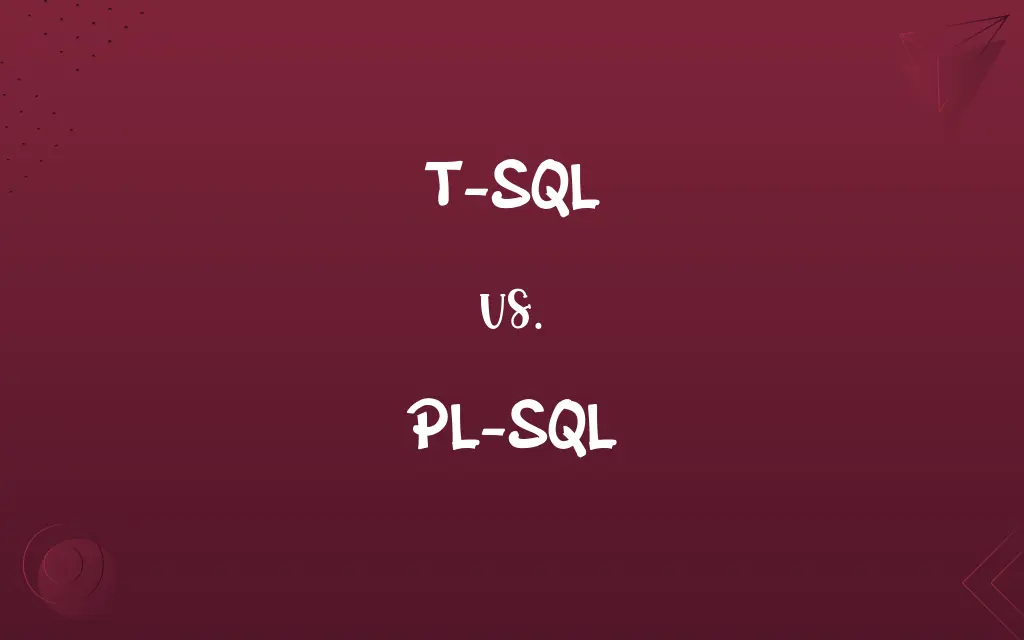T-SQL vs. PL-SQL: Know the Difference

By Shumaila Saeed || Published on February 10, 2024
T-SQL (Transact-SQL) is Microsoft’s extension to SQL for SQL Server, enhancing control and data manipulation, while PL-SQL (Procedural Language/SQL) is Oracle's procedural extension to SQL for Oracle Database.

Key Differences
T-SQL (Transact-SQL) is an extension of SQL developed by Microsoft, specifically designed to interact with SQL Server databases. It adds procedural programming, local variables, and control-of-flow statements to standard SQL. PL-SQL (Procedural Language/SQL) is Oracle's procedural extension to SQL, intended for use with Oracle Database. It includes features like procedures, functions, and packages, enhancing SQL's capabilities for data manipulation and business logic.
Shumaila Saeed
Feb 10, 2024
T-SQL offers unique features like the integration of data retrieval and modification commands into a single statement, and system stored procedures for various administrative tasks. PL-SQL, in contrast, is designed to enhance SQL's data manipulation power within Oracle's ecosystem, offering advanced transaction control, error handling, and a robust suite of tools for database interaction.
Shumaila Saeed
Feb 10, 2024
The syntax and structure of T-SQL commands can be different from standard SQL, focusing on Microsoft's interpretation and optimization for SQL Server. PL-SQL also diverges from standard SQL in its syntax, but it’s specifically tailored to work seamlessly with Oracle Database features and performance optimizations.
Shumaila Saeed
Feb 10, 2024
In T-SQL, there is a strong emphasis on transaction control, error handling, and executing complex queries in a more efficient way for Microsoft SQL Server. PL-SQL, on the other hand, provides a more comprehensive approach to embedding business logic into the database, facilitating the development of complex applications with database-centric operations.
Shumaila Saeed
Feb 10, 2024
Both T-SQL and PL-SQL provide means to create stored procedures, triggers, and functions, but they differ in their approach and syntax. T-SQL is closely integrated with Microsoft SQL Server, while PL-SQL is tightly coupled with Oracle Database, each offering specific features and efficiencies in their respective environments.
Shumaila Saeed
Feb 10, 2024
ADVERTISEMENT
Comparison Chart
Database Compatibility
Specifically for Microsoft SQL Server
Specifically for Oracle Database
Shumaila Saeed
Feb 10, 2024
Key Features
Integrated data retrieval and modification, system stored procedures
Procedures, functions, packages, advanced transaction control
Shumaila Saeed
Feb 10, 2024
Syntax and Structure
Unique syntax, extends standard SQL
Unique syntax, extends standard SQL
Shumaila Saeed
Feb 10, 2024
Optimization and Performance
Optimized for Microsoft SQL Server's environment
Optimized for Oracle Database's environment
Shumaila Saeed
Feb 10, 2024
Use Case
Emphasizes transaction control and error handling
Focuses on embedding business logic into database
Shumaila Saeed
Feb 10, 2024
ADVERTISEMENT
T-SQL and PL-SQL Definitions
T-SQL
T-SQL is Microsoft’s SQL Server extension for adding procedural programming capabilities to SQL.
He wrote a T-SQL script to automate the data cleaning process.
Shumaila Saeed
Jan 24, 2024
PL-SQL
PL-SQL extends SQL with Oracle-specific syntax and structures for enhanced data manipulation.
He implemented a PL-SQL function to calculate complex financial metrics.
Shumaila Saeed
Jan 24, 2024
T-SQL
T-SQL includes unique features like system stored procedures and integrated data modification commands.
The database administrator used T-SQL stored procedures for server maintenance.
Shumaila Saeed
Jan 24, 2024
PL-SQL
PL-SQL is optimized for Oracle Database, offering a robust suite of tools for procedural programming.
The PL-SQL package streamlined multiple database tasks into a single process.
Shumaila Saeed
Jan 24, 2024
T-SQL
T-SQL offers specialized functions and commands unique to Microsoft’s SQL Server environment.
She utilized T-SQL's specialized functions to analyze the sales data.
Shumaila Saeed
Jan 24, 2024
ADVERTISEMENT
PL-SQL
PL-SQL is Oracle's procedural extension for SQL, enhancing database interaction in Oracle Database.
The developer used PL-SQL to write a procedure for monthly data aggregation.
Shumaila Saeed
Jan 24, 2024
T-SQL
T-SQL enhances SQL with additional syntax for improved control and efficiency in SQL Server.
The T-SQL query optimized data retrieval from multiple tables efficiently.
Shumaila Saeed
Jan 24, 2024
PL-SQL
PL-SQL facilitates embedding business logic into Oracle databases through its procedural features.
Using PL-SQL, the team embedded complex business rules directly into the database.
Shumaila Saeed
Jan 24, 2024
T-SQL
T-SQL is tailored for SQL Server, focusing on transaction control and complex query execution.
T-SQL was used to manage complex transactions within the financial database.
Shumaila Saeed
Jan 24, 2024
PL-SQL
PL-SQL includes features like advanced transaction control and error handling in Oracle environments.
PL-SQL's exception handling feature was crucial in debugging the database application.
Shumaila Saeed
Jan 24, 2024
Repeatedly Asked Queries
Is PL-SQL compatible with non-Oracle databases?
PL-SQL is tailored for Oracle Database and is not compatible with other database systems.
Shumaila Saeed
Feb 10, 2024
What is T-SQL?
T-SQL is Microsoft's extension to SQL, adding procedural programming features for SQL Server.
Shumaila Saeed
Feb 10, 2024
Are PL-SQL and T-SQL syntax the same?
No, each has unique syntax and capabilities tailored to their respective database systems.
Shumaila Saeed
Feb 10, 2024
Can T-SQL be used with databases other than SQL Server?
No, T-SQL is specifically designed for Microsoft SQL Server.
Shumaila Saeed
Feb 10, 2024
What are the main strengths of T-SQL?
T-SQL's strengths include efficient transaction control, complex query execution, and system stored procedures.
Shumaila Saeed
Feb 10, 2024
What features make PL-SQL unique?
PL-SQL offers advanced transaction control, error handling, and is optimized for Oracle Database's features.
Shumaila Saeed
Feb 10, 2024
Can I use standard SQL commands in T-SQL?
Yes, T-SQL extends standard SQL, so most SQL commands work in T-SQL.
Shumaila Saeed
Feb 10, 2024
What's the learning curve like for PL-SQL?
PL-SQL requires a solid understanding of SQL and Oracle Database's features.
Shumaila Saeed
Feb 10, 2024
What is PL-SQL?
PL-SQL is Oracle's procedural extension to SQL for Oracle Database.
Shumaila Saeed
Feb 10, 2024
What's the role of stored procedures in T-SQL?
Stored procedures in T-SQL are used for automating complex database tasks and improving performance.
Shumaila Saeed
Feb 10, 2024
How does PL-SQL handle business logic?
PL-SQL embeds business logic into the database, allowing for more complex data operations.
Shumaila Saeed
Feb 10, 2024
Is T-SQL suitable for beginners?
T-SQL can be complex, but it's accessible for beginners familiar with basic SQL.
Shumaila Saeed
Feb 10, 2024
What types of applications benefit from PL-SQL?
Database-centric applications, especially those requiring complex transactions and data processing, benefit from PL-SQL.
Shumaila Saeed
Feb 10, 2024
Can T-SQL queries be optimized for performance?
Yes, T-SQL provides various optimization techniques specific to SQL Server.
Shumaila Saeed
Feb 10, 2024
Does PL-SQL offer error handling mechanisms?
Yes, PL-SQL has comprehensive error handling features for robust database applications.
Shumaila Saeed
Feb 10, 2024
Are there any certification programs for T-SQL?
Microsoft offers certification programs that cover T-SQL and SQL Server.
Shumaila Saeed
Feb 10, 2024
Can PL-SQL be used for data analysis?
PL-SQL can be used for data analysis, especially when dealing with complex data structures in Oracle Database.
Shumaila Saeed
Feb 10, 2024
Is T-SQL evolving with new SQL Server versions?
Yes, T-SQL continuously evolves with new features and improvements in each SQL Server release.
Shumaila Saeed
Feb 10, 2024
How integral is PL-SQL to Oracle Database programming?
PL-SQL is a core component of Oracle Database programming, essential for creating advanced database applications.
Shumaila Saeed
Feb 10, 2024
How does T-SQL handle data retrieval and modification?
T-SQL combines data retrieval and modification commands for efficient database operations.
Shumaila Saeed
Feb 10, 2024
Share this page
Link for your blog / website
HTML
Link to share via messenger
About Author
Written by
Shumaila SaeedShumaila Saeed, an expert content creator with 6 years of experience, specializes in distilling complex topics into easily digestible comparisons, shining a light on the nuances that both inform and educate readers with clarity and accuracy.









































































